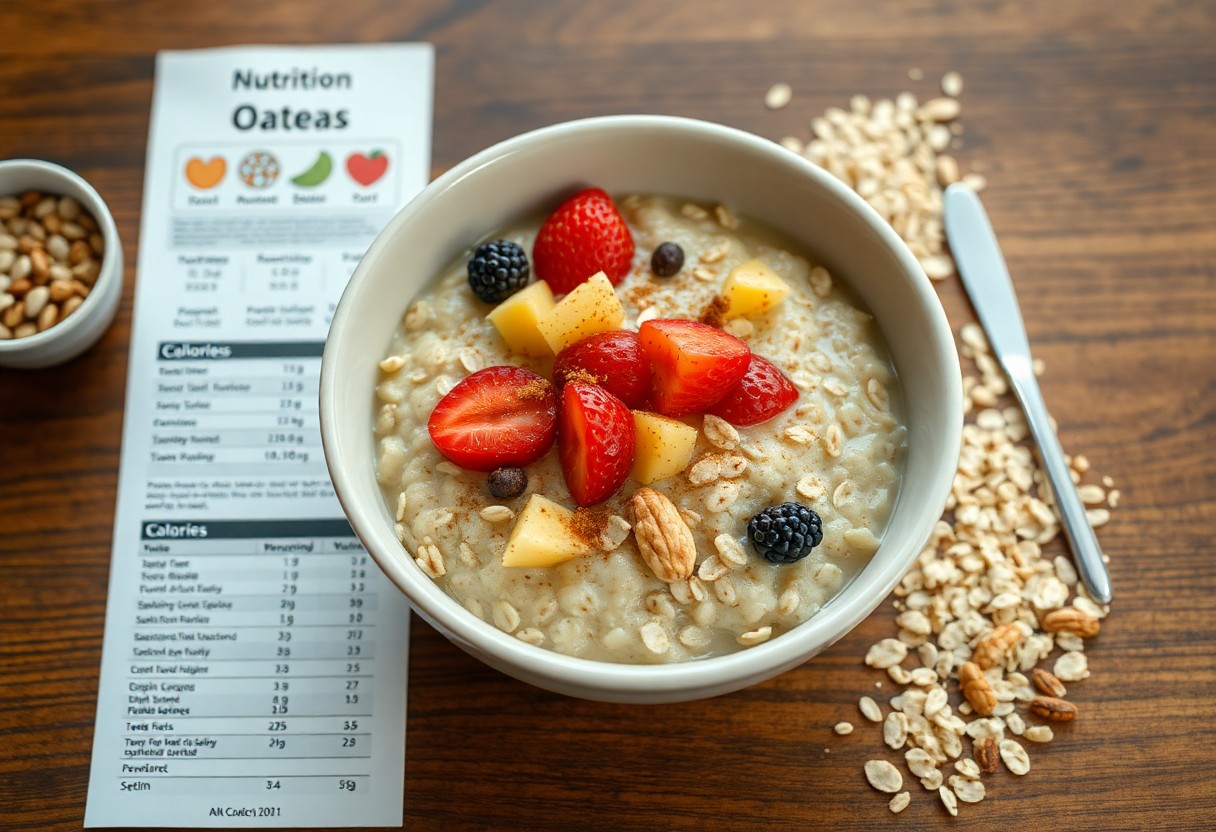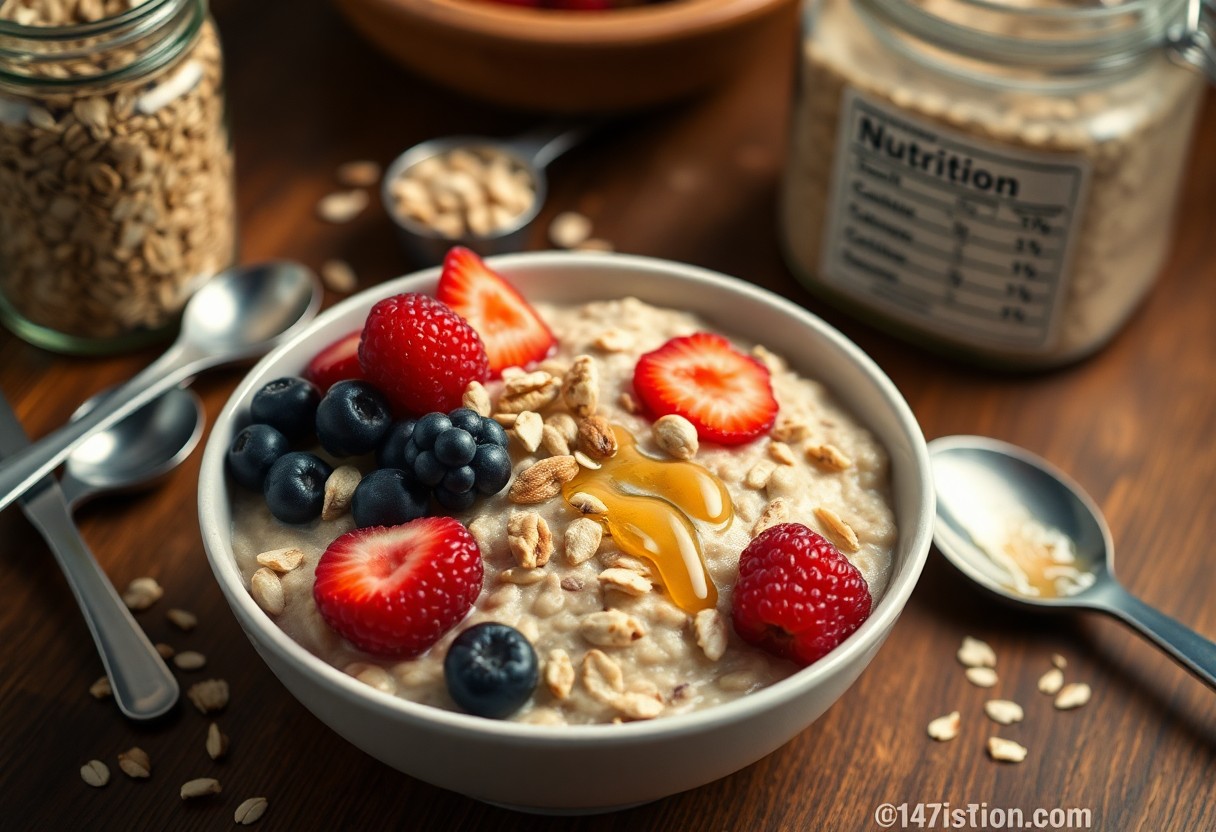You may not realize how beneficial oats can be for your health and diet. Packed with necessary nutrients, including fiber, protein, and vitamins, oats provide a myriad of health advantages, from heart health to improved digestion. Understanding their caloric content and how they fit into your daily meals can help you make informed dietary choices. In this post, you will uncover the remarkable nutritional value of oats and learn how to incorporate them into your lifestyle for optimal health benefits.

Key Takeaways:
- Oats are rich in dietary fiber, particularly beta-glucan, which supports heart health and regulates blood sugar levels.
- They provide crucial nutrients, including vitamins B1, B5, iron, magnesium, and antioxidants, contributing to overall health.
- A serving of oats typically contains around 150 calories, making them a nutritious, low-calorie option for meals or snacks.
Nutritional Composition of Oats
You’ll find that oats have a unique nutritional profile, packed with macronutrients and micronutrients. A typical serving contains around 150 calories, offering a blend of carbohydrates, proteins, and fats that appeal to various dietary needs. They stand out as a hearty source of energy, fiber, and important vitamins and minerals, making them a valuable addition to any diet.
Macronutrients
In terms of macronutrients, one cup of cooked oats contains about 27 grams of carbohydrates, 6 grams of protein, and 3.5 grams of fat. The high fiber content, particularly soluble fiber like beta-glucan, contributes to satiety and digestive health. This balanced macronutrient composition makes oats a fulfilling and sustaining food choice.
Micronutrients
Oats are rich in various micronutrients, including manganese, phosphorus, magnesium, iron, and zinc. These minerals play key roles in bone health, energy production, and immune function. Manganese, for instance, supports metabolism and antioxidant defenses, while magnesium aids in muscle function and blood pressure regulation.
Delving deeper into micronutrients, you’ll see that a single serving of oats provides approximately 60% of your daily manganese requirement and significant percentages of phosphorus and magnesium. Iron helps transport oxygen in the blood, while zinc contributes to immune function. This diverse array of micronutrients not only supports everyday health but also enhances your body's resilience against illnesses. Incorporating oats into your meals ensures you’re not just filling your stomach but also nourishing your body with important vitamins and minerals.
Health Benefits of Oats
Consuming oats regularly can significantly enhance your overall health, offering a range of benefits from improved digestion to better heart health. Packed with vital nutrients, including vitamins, minerals, and antioxidants, oats can transform your diet while providing sustained energy throughout the day.
Heart Health
Oats are rich in soluble fiber, particularly beta-glucan, which has been shown to lower LDL cholesterol levels. Incorporating oats into your daily diet can help reduce the risk of heart disease by promoting better vascular function and lowering blood pressure.
Weight Management
Including oats in your diet supports weight management by promoting a feeling of fullness due to their high fiber content. Eating a bowl of oats can curb your appetite and reduce cravings, making it easier to stick to your nutritional goals.
Oats also have a low energy density, meaning they provide fewer calories relative to their volume, which can help you eat less while feeling satisfied. A study found that consuming whole oats can lead to reduced calorie intake later in the day. By substituting processed snacks with a hearty bowl of oatmeal, you can significantly decrease your overall caloric consumption, making weight loss more achievable and sustainable. Consider adding fruits or nuts for additional nutrients without compromising your weight goals.
Caloric Information of Oats
Oats offer a range of caloric values depending on the form in which they are consumed. For example, one cup of cooked oats generally contains around 154 calories, making them a filling and low-calorie option for breakfast or snacks. Their nutritional density is high, with a blend of carbohydrates, protein, and healthy fats contributing to an overall balanced diet.
Serving Sizes
The standard serving size for steel-cut or rolled oats is typically about 1/2 cup dry, which yields approximately 1 cup when cooked. This portion is ideal for breakfast, providing a satisfying base that you can customize with fruits, nuts, or sweeteners as desired, ensuring balanced nutrition for your meal.
Comparison with Other Grains
Oats stand out among grains due to their higher fiber content and lower glycemic index compared to others, such as rice or wheat. For instance, a serving of oats has 4 grams of dietary fiber, while white rice has less than 1 gram. This property promotes better digestion and sustained energy levels throughout the day.
| Oats (1 cup cooked) | 154 calories |
| Brown Rice (1 cup cooked) | 218 calories |
| Quinoa (1 cup cooked) | 222 calories |
| White Rice (1 cup cooked) | 205 calories |
In terms of caloric density, oats provide a more nutrient-rich choice compared to grains like brown rice and quinoa, which, despite being whole grains, have higher caloric values and lower fiber content. This makes oats an optimal choice for managing weight while still delivering vital nutrients and energy.
| Oats (1 cup cooked) | 4 g fiber |
| Brown Rice (1 cup cooked) | 3.5 g fiber |
| Quinoa (1 cup cooked) | 5 g fiber |
| White Rice (1 cup cooked) | 0.6 g fiber |
Role of Oats in a Daily Diet
Incorporating oats into your daily diet can enhance your overall health due to their high fiber content, which promotes digestive health and aids in maintaining stable blood sugar levels. Consider exploring Oats: Health benefits, facts, research to gain deeper insights on why they’re a smart addition to your meals.
Breakfast Options
Oats serve as an excellent base for breakfast, allowing for endless customization. You can enjoy them as classic oatmeal topped with fruits, nuts, or honey, or opt for overnight oats soaked in milk or yogurt for a convenient, on-the-go option. Each serving boosts your morning energy while keeping hunger at bay.
Incorporating Oats into Meals
Add oats to your meals beyond breakfast to reap their benefits all day. They can be blended into smoothies for added texture and nutrients, used as a thickening agent in soups or stews, or mixed into meat dishes to increase fiber and protein content.
Innovatively using oats expands their role in your diet. For a nutrient-rich meal, consider adding them to homemade veggie burgers for a delightful crunch, or using oat flour in baking to enhance nutritional value without compromising flavor. Even savory dishes like meatloaf benefit from oats, which can help bind ingredients while providing a health boost.
Oats and Digestive Health
Oats play a significant role in promoting digestive health, thanks to their rich composition of soluble and insoluble fibers. They not only aid in regular bowel movements but also support the growth of beneficial bacteria in your gut, enhancing overall gut function and stability.
Fiber Content
Your daily intake of oats contributes a substantial amount of fiber, particularly beta-glucan, which can reach up to 5-7 grams per serving. This fiber helps create a gel-like substance in your digestive tract, slowing digestion and ensuring a steady release of glucose into your bloodstream, reducing blood sugar spikes.
Impact on Gut Health
The prebiotic effect of oats fosters a positive environment for gut microbiota. By providing nourishment to beneficial bacteria, oats promote microbial diversity, which is vital for good digestion, immune function, and mental health. Increased diversity in your gut microbiome is linked to lower risks of gastrointestinal diseases.
Studies have shown that consuming oats regularly can lead to an increase in beneficial bacteria such as Bifidobacterium and Lactobacillus. These microorganisms are associated with improved digestion, production of short-chain fatty acids, and reduced inflammation within the gut. Additionally, individuals experiencing constipation often find relief by incorporating oats into their diet, thanks to their ability to enhance stool bulk and promote regularity. The prebiotic properties of oats can even support mental well-being by potentially impacting the gut-brain axis, making them a staple for digestive and overall health.

Oats: A Suitable Food for Various Diets
Oats seamlessly fit into a variety of dietary plans, making them an excellent choice for anyone looking to improve their nutrition. Their versatility allows you to enjoy oats in numerous forms, from traditional oatmeal to granola and protein bars. They are not only filling but also help maintain stable blood sugar levels, making them a smart option for those managing weight or seeking to optimize their health through food.
Gluten-Free Options
For gluten-sensitive individuals, oats offer a great alternative, provided you select certified gluten-free varieties. Cross-contamination can often occur during processing, making it vital to look for oats specifically labeled as gluten-free. Enjoying these oats can provide similar health benefits as regular oats, including a balanced fiber intake and vital nutrients.
Vegan and Vegetarian Benefits
Oats serve as a fantastic staple for vegans and vegetarians, rich in plant-based proteins and vital nutrients. Incorporating oats into your meals not only enhances your protein intake but also adds important vitamins and minerals crucial for a balanced diet. They serve as an excellent base for smoothies, baked goods, and savory meals, facilitating easy integration into various plant-based recipes.
Oats provide about 6 grams of protein per cup, making them a valuable source for those following plant-based diets. The variety of flavors and textures available allows you to enjoy oats in numerous ways, from overnight oats to oat-based pancakes. Additionally, they contain beta-glucan, a type of soluble fiber that aids in managing cholesterol levels, offering further health benefits. Their versatility means you can easily combine oats with fruits, nuts, and non-dairy milk, creating nutrient-dense meals tailored to your dietary preferences.
To wrap up
With these considerations, you can appreciate the remarkable nutritional value of oats and how they can enhance your daily diet. Packed with vital nutrients and health benefits, incorporating oats into your meals can support your overall well-being and promote healthy eating habits. For more insights on oats, explore Oats - The Nutrition Source to further understand their role in your diet and how they can contribute to a healthier lifestyle.
FAQ
Q: What is the nutritional value of oats?
A: Oats are rich in carbohydrates, fiber, and protein. A typical serving of cooked oats (1 cup) contains about 154 calories, 27 grams of carbohydrates, 6 grams of protein, and 4 grams of dietary fiber, as well as vitamins and minerals like manganese, phosphorus, magnesium, and iron.
Q: What are the health benefits of consuming oats?
A: Oats offer several health benefits, including improving heart health due to their high beta-glucan content, supporting digestive health through dietary fiber, aiding in weight management by promoting satiety, and helping regulate blood sugar levels, making them beneficial for diabetics.
Q: How do oats fit into a daily diet?
A: Oats can be a versatile part of a daily diet. They can be eaten as a breakfast option, added to smoothies, or used in baking. Incorporating oats regularly can contribute to overall health, providing sustained energy throughout the day.
Q: How many calories are in oats?
A: One cup of cooked oats contains approximately 154 calories. The calorie count may vary depending on cooking methods and added ingredients such as milk, sweeteners, or fruits.
Q: Are oats suitable for everyone in a daily diet?
A: While oats are generally safe and beneficial for most individuals, those with celiac disease or gluten sensitivity should choose certified gluten-free oats. Consulting with a healthcare provider is advisable for personalized dietary recommendations.

0 Comments